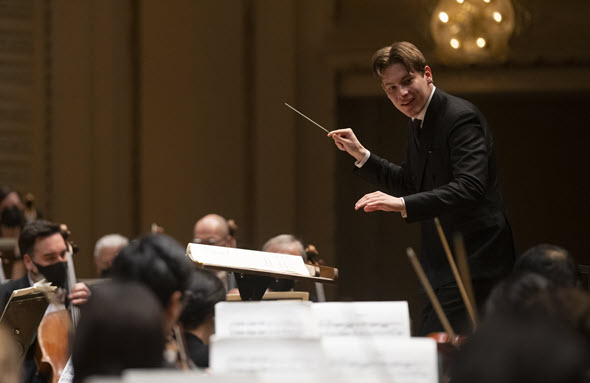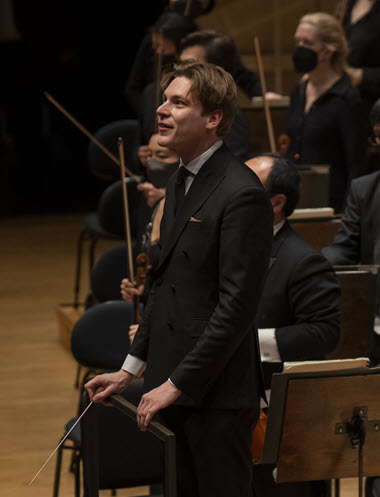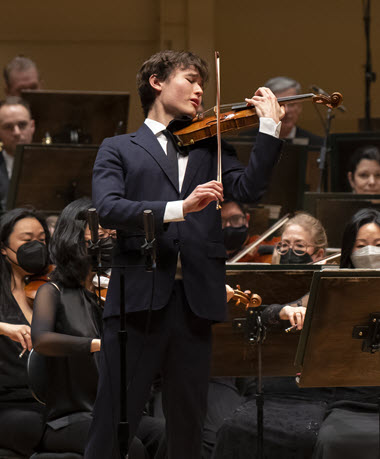Meteoric maestro Klaus Mäkelä blazes through with CSO, and we’re back in his orbit next year
COMMENTARY: In his Chicago Symphony debut, the young Finnish conductor showed why he has electrified orchestras across Europe.
By Lawrence B. Johnson
Mark the name of Finnish conductor Klaus Mäkelä, and draw a heavy red circle around the weekend of Feb. 16-18, 2023, when he returns for his second appearance with the Chicago Symphony Orchestra. As his CSO debut April 14 displayed generously, this 26-year-old conductor is special. His exquisite reading of Stravinsky’s complete ballet “The Firebird” was like Page 1 news. By the end of that 45-minute demonstration of brilliance, maturity and imagination, I was sold. I was also at the back of a long line of admirers.
Consider Mäkelä’s meteoric ascent. In 2017 – at age 21, mind you – he made his debut with the Swedish Radio Orchestra, which promptly signed him as principal guest conductor. The next year, he debuted with the Oslo Philharmonic, which immediately handed him the baton as chief conductor. The year after that, in 2019, Mäkelä appeared for the first time with the Orchestre de Paris. Bingo! Just like that, he was named music director. In his mid-twenties, this remarkable musician now presides over the principal orchestras of both Oslo and Paris. To witness his prodigious mastery is to understand how Mäkelä landed two important posts on the basis of single showings.
When he returns to Chicago next February, he will lead Mahler’s Symphony No. 5 in C-sharp minor. Having just played “Firebird” under Mäkelä, even members of the CSO also must have circled that week on their rehearsal calendars.
What the young Finnish maestro conjured in “The Firebird” ranks with the finest performances I’ve ever heard from the Chicago Symphony, and that covers many a year. The insight, finesse and not least patience that Mäkelä evinced brought to mind Bernard Haitink and his mastery of turning understatement to electrifying effect. I’m not referring to big, obvious gestures like the infernal dance of Kashchei, which the CSO would turn into an astonishing conflagration under almost any baton. I’m talking about the many quiet places: the evocation of the magic garden at the beginning, the ballet’s pervasive aura of enchantment and certainly the berceuse, a serene and shimmering lullaby by which the Firebird subdues the evil magician.
These became magic moments indeed as Mäkelä spun gentle lines from the woodwinds and drew sparkling, soft textures from the violins. Mäkelä never seemed to generalize. His gestures were quite precise and yet free-flowing. He got such marvelous results by establishing the dynamic baseline at a point just within audibility, then building up and out from there. It was the concept and the execution of a conductor well beyond this young man’s years. And the CSO responded with a collective refinement and mutual awareness that stamps rare moments even among orchestras the stature of this one.
Mäkelä was impressive at every turn in his CSO debut, starting with the bracing, vivacious and idiosyncratic “Eleven Gates” by Swedish composer Anders Hillborg. Over its 20-minute course, Hillborg’s fanciful flight caroms through 11 diverse and always surprising perspectives on an orchestra’s timbral landscape.
Here, and in his collaboration with Swedish violinist Daniel Lozakovich in Prokofiev’s Violin Concerto No. 2 in G minor, displayed an easy rapport with the musical idiom at hand. Lozakovich, 21 years old and also making his CSO debut, delivered an eloquent and technically assured account of Prokofiev’s shadowy, careening and deceptively virtuosic concerto. This rising star has a glittering future.




